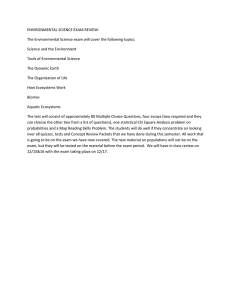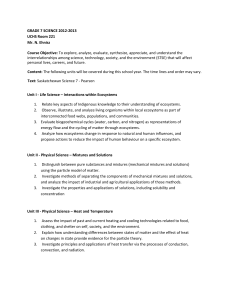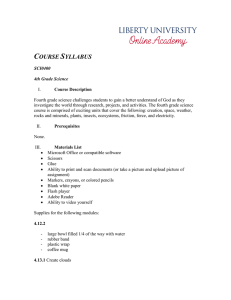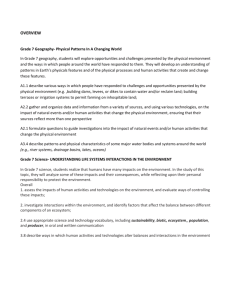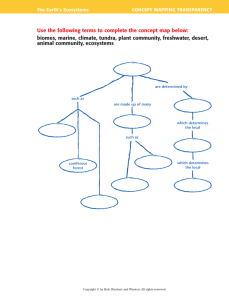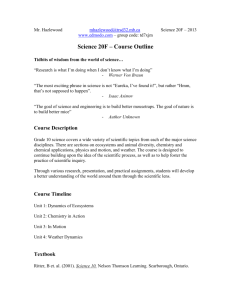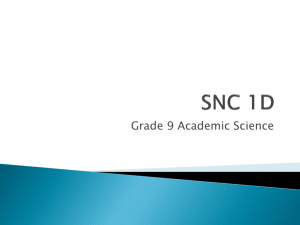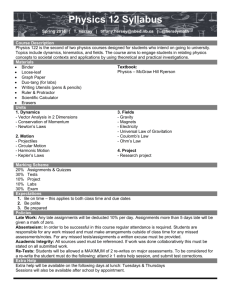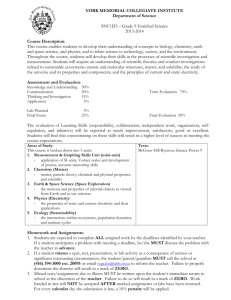SSHS - GRADE 10 SCIENCE COURSE OUTLINE: 2014-2015
advertisement
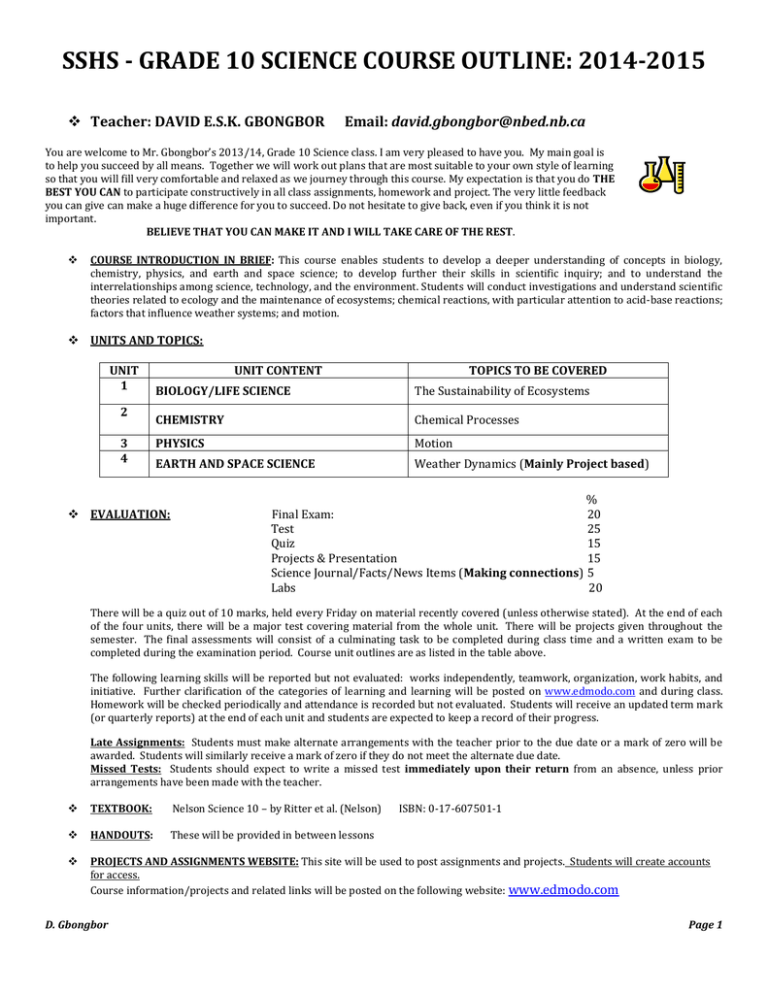
SSHS - GRADE 10 SCIENCE COURSE OUTLINE: 2014-2015 Teacher: DAVID E.S.K. GBONGBOR Email: david.gbongbor@nbed.nb.ca You are welcome to Mr. Gbongbor’s 2013/14, Grade 10 Science class. I am very pleased to have you. My main goal is to help you succeed by all means. Together we will work out plans that are most suitable to your own style of learning so that you will fill very comfortable and relaxed as we journey through this course. My expectation is that you do THE BEST YOU CAN to participate constructively in all class assignments, homework and project. The very little feedback you can give can make a huge difference for you to succeed. Do not hesitate to give back, even if you think it is not important. BELIEVE THAT YOU CAN MAKE IT AND I WILL TAKE CARE OF THE REST. COURSE INTRODUCTION IN BRIEF: This course enables students to develop a deeper understanding of concepts in biology, chemistry, physics, and earth and space science; to develop further their skills in scientific inquiry; and to understand the interrelationships among science, technology, and the environment. Students will conduct investigations and understand scientific theories related to ecology and the maintenance of ecosystems; chemical reactions, with particular attention to acid-base reactions; factors that influence weather systems; and motion. UNITS AND TOPICS: UNIT 1 2 3 4 UNIT CONTENT TOPICS TO BE COVERED BIOLOGY/LIFE SCIENCE The Sustainability of Ecosystems CHEMISTRY Chemical Processes PHYSICS Motion EARTH AND SPACE SCIENCE Weather Dynamics (Mainly Project based) EVALUATION: % Final Exam: 20 Test 25 Quiz 15 Projects & Presentation 15 Science Journal/Facts/News Items (Making connections) 5 Labs 20 There will be a quiz out of 10 marks, held every Friday on material recently covered (unless otherwise stated). At the end of each of the four units, there will be a major test covering material from the whole unit. There will be projects given throughout the semester. The final assessments will consist of a culminating task to be completed during class time and a written exam to be completed during the examination period. Course unit outlines are as listed in the table above. The following learning skills will be reported but not evaluated: works independently, teamwork, organization, work habits, and initiative. Further clarification of the categories of learning and learning will be posted on www.edmodo.com and during class. Homework will be checked periodically and attendance is recorded but not evaluated. Students will receive an updated term mark (or quarterly reports) at the end of each unit and students are expected to keep a record of their progress. Late Assignments: Students must make alternate arrangements with the teacher prior to the due date or a mark of zero will be awarded. Students will similarly receive a mark of zero if they do not meet the alternate due date. Missed Tests: Students should expect to write a missed test immediately upon their return from an absence, unless prior arrangements have been made with the teacher. TEXTBOOK: Nelson Science 10 – by Ritter et al. (Nelson) HANDOUTS: These will be provided in between lessons PROJECTS AND ASSIGNMENTS WEBSITE: This site will be used to post assignments and projects. Students will create accounts for access. Course information/projects and related links will be posted on the following website: www.edmodo.com D. Gbongbor ISBN: 0-17-607501-1 Page 1 SSHS - GRADE 10 SCIENCE COURSE OUTLINE: 2014-2015 TO ENSURE SUCCESS, YOUR NOTEBOOK SHOULD LOOK LIKE: A three-ring binder divided into four units by dividers Each page should be titled and dated Tests and quizzes should be placed at the end of the material covered within it Notes need to be neat, titled, and numbered. I will be checking your notes periodically. Separate sections may be needed for unit projects IN ORDER TO BE SUCCESSFUL: Come to class prepared to work – with notebook, textbook, and writing materials Review your notes frequently (especially before quizzes and tests) If you are unsure of anything, ask questions and/or stay for extra help Have someone in the class you can call to catch up, if you miss a day (see below) Be self-motivated – you must accept responsibility for your learning PARENTS / GUARDIANS – YOU CAN BEST HELP YOUR STUDENT BY: Helping your student review before quizzes (i.e. Thursday nights) and tests Keeping informed of test dates and assignment deadlines Encourage your student to come in for extra help Keeping in touch with your student’s teachers (Mr. Gbongbor) Allowing your student time and a quiet place to study or do homework LABORATORY RULES: (Safety contracts will be distributed to be signed by both student and parent /guardian) All science courses at Sugarloaf Senior High contain varying amounts of lab and project works. These works increases the student interest and provides the practical skills that will be useful in later studies. There are, however, two major drawbacks: it is potentially dangerous, and much of the equipment is expensive and fragile. If it is mishandled, the cost of replacement is high. To minimize these two disadvantages, the following lab rules will be enforced at all times. Students who repeatedly break lab rules will be counseled individually. If, after counseling, there is no improvement, the student may be withdrawn from lab activities (and virtual labs or test of practical work will be assigned) to ensure the safety of others in All equipment must be used according to the teacher’s instructions Each student must know the location of and how to use: the fire extinguisher the fire blanket the eyewash station the first aid kit Safety glasses and other safety equipment MUST be worn when instructed. At the end of the period: the sink must be clean the desktop must be clean and dry all equipment must be cleaned and returned to its original location use the sinks (or washroom) to wash hands clean especially after using chemicals during labs. no student may leave the lab until dismissed by the teacher Students must refrain from playing with the water taps and gas jets to avoid damage and leakage. Students must not mark the desk in any way. Under no circumstances are the students allowed to sit on the lab desktops. This will prevent expensive damage to the desk and relevant plumbing. TO ENCOURAGE CAREFUL WORK HABITS A STUDENT WILL BE ASKED TO LEAVE THE LAB FOR VIOLATING THE LAB RULES OR FOR BROKEN EQUIPMENT IF, IN THE OPINION OF THE TEACHER, SUCH BREAKAGE COULD HAVE BEEN AVOIDED. Usually the student will be given a related reading assignment on a virtual lab to be presented in place of the missed activity. HOMEWORK PARTNERS: Name: ___________________________ Phone #: _________________ ;Name: ________________________;Phone #: ______________ These will be allowed to pick up handouts or any other important information for you in case you are absent from school. D. Gbongbor Page 2 SSHS - GRADE 10 SCIENCE COURSE OUTLINE: 2014-2015 The four units of study in this course will be broken down as follows: Unit I Life Science: Sustainability of Ecosystems (Ch. 1 – 4) Students will: (1) explore cultural perspectives on sustainability; (2) examine biodiversity within selected ecosystems; (3) analyze population dynamics within an ecosystem; (4) identify cycles, change and stability in ecosystems and (5) investigate human impact on ecosystems Unit II Physical Science: Chemical Reactions (5 – 8) Students will: (1) observe common chemical reactions in the world (2) represent chemical reactions symbolically using models, word equations, and balanced chemical equations (3) identify characteristics of chemical reaction involving organic compounds (4) identify factors that affect the rates of chemical reactions (5) investigate chemical reaction involving acids and bases Unit III Physical Science: Motion in our World (Ch. 9, 10, 11.1-11.3, 12.7) Students will: (1) explore motion related technologies; (2) observe and describe motion of everyday objects (3) investigate the relationship among distance, speed , time and acceleration for objects that show uniform motion (4) investigate the relationship among distance, speed , time and acceleration for objects that show uniformly accelerated motion (5) analyze graphically and mathematically the relationship among distance, speed time and acceleration for objects that undergo simple linear motion or uniformly accelerated motion (6) investigate the concept of vectors and addition of vectors (7) investigate acceleration of objects due to gravitational attraction Unit IV Earth and Space Science: Weather Dynamics Students will: (1) explore the causes and impact of severe weather in Canada (2) analyze selected meteorological data (3) explain the principles of weather (4) forecast local weather conditions (5) identify consequences of global climate change Note: The order in which these units are taught could vary per semester. D. Gbongbor Page 3
